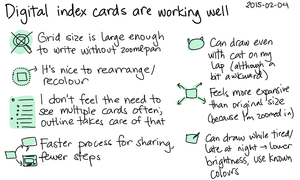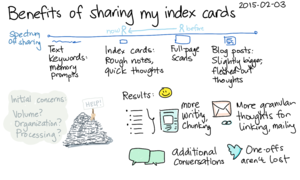Shrinking my learn-do-share-review cycle
Posted: - Modified: | learning, sharingSometimes I read too much without doing anything about what I learn. By the time I get around to applying ideas, my memory is fuzzy and I have to dig up my notes anyway. Sometimes I never get around to applying what I've learned.
Sometimes the tasks on my TODO list are too big to fit into a single session of thinking-about or doing, so I end up procrastinating them. Or sometimes I do them, but I feel like I'm wandering around.
Sometimes I let myself focus too much on learning and doing, moving onward. By the time I want to share what I've learned, I feel like there's just so much background I need to cover before people can get to the point of being able to do things. Or I've forgotten what those first crucial steps were.
Sometimes I get so caught up in learning, doing, or sharing, that I forget to spend time thinking about how I'm doing things. I've been keeping a journal, but the entries are often very short – just keywords that describe what I did, without notes on how I might do it better.
Have you felt like that too? Tell me I'm not the only one who has to think about the balance. =)
I've been working on reducing waste by shortening this learn-do-share cycle. Instead of spending a week reading five books about a topic, I might spend a couple of hours reading one book, extracting the key points from it, and identifying one or two actions I can try. Instead of doing an exhaustive search to find the best tool for what I want to do, I'll do a quick search, pick one, try it out, and then use that experience to help me learn. Instead of waiting until I feel confident about a topic (or even until I've worked out all the bugs), I'll share while I learn. Instead of trying to fill in all the gaps between where a beginner might start and where my post ends up, I write just the part that's fresh in my memory, and then I might fill in other gaps when people ask.
In fact, I've been moving towards posting more of my rough notes using index cards. That way, I don't even have to wait until I've summarized the cards into a more coherent blog post. They're out there already, easy to link to or share in conversations. I still suspect it's a bit of a firehose of incoherence, but I'm pleasantly surprised that some people actually find them interesting. =)
A fast learn-do-share cycle results in a new challenge: What do you do with all these little pieces? This matters for both organizing your own notes and making it easier for other people to learn.
I've been refining my workflows for organizing my index cards, snippets, and posts into outlines. Picking descriptive titles definitely helps. Fortunately, other people have given this challenge of personal knowledge management much thought. Zettelkasten looks like an interesting keyword to research, and I'm looking forward to picking up ideas from other people's techniques.
When it comes to organizing notes for other people, I'm still rather haphazard, but I'm planning to braindump a large outline of questions and use that to create maps for people.
As for the actual division of time, the pomodoro technique isn't part of my habitual workflow yet, but I've heard good things about it. Maybe I'll experiment with a pomodoro-based schedule: one for learning, one for doing, and one for sharing. But my learning cycle's actually a lot more intertwined. At its best, I'm learning as I'm doing (flipping between windows as needed), and the notes that I take while I'm learning and doing (thanks to Org Mode and literate programming!) can easily be shared as a blog post. So maybe each chunk of time represents a topic instead, and I can track whether I'm successfully getting things all the way through to the sharing stage.
Sure, some topics require deeper reflection and integration. For instance, you can't expect instant results from philosophy. But it might be interesting to shorten the distance from learning to action and from action to sharing.
I like the tips in Christian Tietze's "Use a Short Knowledge Cycle to Keep Your Cool" on how to figure out a good "size" for your research tasks so that you don't feel overwhelmed by them. It's a good reminder to iterate: you don't have to research everything before you start trying things out, you don't have to know everything before you start writing, and you don't have to have a perfect process – you can keep improving it.
So we'll see how this works out. For example, this post took me half an hour to research/think about, and another half-hour to write. It could be more interesting if I researched some more (found similar techniques, contrasting opinions, etc.), and it could be richer with more experiments and experiences, but here it is. I can always add to it in the future, or write another post and link to the previous one.


